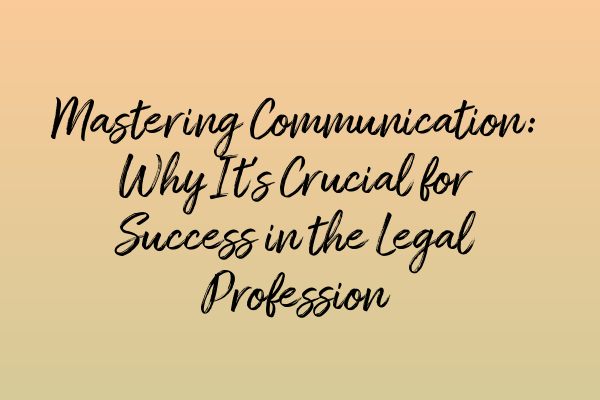Mastering Communication: Why It’s Crucial for Success in the Legal Profession
Effective communication is the cornerstone of success in any profession, and the legal industry is no exception. As a solicitor, your ability to communicate clearly and effectively can make or break your career. In this blog post, we will explore the importance of mastering communication skills in the legal profession and provide valuable tips on how to enhance your communication abilities.
Why is Communication Important?
Communication plays a vital role in every aspect of a solicitor’s work. Whether you are drafting legal documents, negotiating with opposing counsel, or presenting your arguments in court, effective communication is crucial to achieving your desired outcomes. Clear and concise communication ensures that your message is accurately conveyed, reduces the risk of misunderstandings, and builds trust with clients, colleagues, and stakeholders.
In the legal profession, communication extends beyond verbal and written skills. Non-verbal cues, such as body language and tone of voice, also play a significant role in conveying your message. Being mindful of these non-verbal cues can enhance your ability to connect with others and influence their perceptions.
Developing Strong Written Communication Skills
As a solicitor, you will spend a significant amount of time drafting legal documents, including contracts, pleadings, and opinions. To master written communication, consider the following tips:
- Use plain and concise language: Avoid excessive legal jargon and use plain language that is easily understood by your intended audience. This not only enhances comprehension but also aids in building rapport with clients who may not have a legal background.
- Organize your thoughts: Before you begin writing, create an outline to ensure your document flows logically and coherently. A well-structured document is easier to comprehend and will be more effective in conveying your message.
- Edit and proofread: Take the time to review and edit your work for clarity, grammar, and punctuation errors. Attention to detail is crucial in legal writing, and errors can undermine the credibility of your work.
For more in-depth guidance on enhancing your written communication skills, check out our related article: A Closer Look at the Bar Professional Training Course (BPTC).
Mastering Verbal Communication
Verbal communication is vital for solicitors, especially during client consultations, negotiations, and courtroom appearances. To improve your oral communication skills, consider the following tips:
- Active listening: Pay close attention to others and demonstrate that you value their input. Active listening involves maintaining eye contact, nodding in agreement, and providing appropriate verbal and non-verbal cues.
- Clarity and conciseness: When speaking, aim to be clear and concise. Avoid using excessive legal jargon and explain complex concepts in a simplified manner, ensuring understanding by all parties involved.
- Empathy and rapport-building: Developing empathy towards your clients and colleagues will help establish rapport and trust. Empathetic communication involves acknowledging and understanding the emotions and concerns of others.
To gain further insights into the role of technology in modern legal practice, don’t miss our related article: The Role of Technology in Modern Legal Practice.
The Power of Non-Verbal Communication
While verbal and written communication are essential, non-verbal cues can significantly impact how your message is received. Some key aspects of non-verbal communication include:
- Body language: Be conscious of your posture, gestures, and facial expressions, as they can convey confidence, interest, and sincerity.
- Tone of voice: Use your voice to convey emotion and emphasize important points. A confident and controlled tone can enhance your credibility and make your message more persuasive.
- Eye contact: Maintain appropriate eye contact to establish trust and connection with your audience. Avoid excessive or minimal eye contact, as both can be perceived negatively.
To explore more about prominent law firms in the UK, check out our related article: A Look into Prominent Law Firms in the UK.
Adapting to Different Communication Styles
Effective communication requires recognizing and adapting to different communication styles. Some people prefer direct and to-the-point conversations, while others appreciate a more empathetic and supportive approach. To navigate these differences:
- Be adaptable: Observe and assess the communication style of the person you are interacting with. Adjust your approach accordingly to ensure effective communication.
- Ask clarifying questions: If you are unsure about the other person’s perspective or message, ask clarifying questions to avoid misunderstandings.
Conclusion
Mastering communication is essential for success in the legal profession. Strong written, verbal, and non-verbal communication skills are critical for building relationships, influencing outcomes, and effectively advocating for your clients. By continuously refining and honing your communication abilities, you will become a more effective and impactful solicitor.
For debunking common misconceptions about solicitors, be sure to read our related article: Debunking Common Misconceptions about Solicitors.
If you’re interested in learning effective networking strategies for building a strong professional network as a solicitor, our related article is a must-read: Networking Strategies for Solicitors: Building a Strong Professional Network.


Leave a Reply